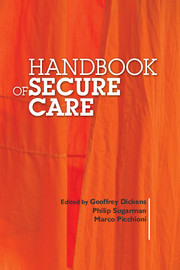Book contents
- Frontmatter
- Contents
- List of tables, boxes and figures
- List of contributors
- Preface
- 1 The evolution of secure and forensic mental healthcare
- 2 Mental disorder and offending
- 3 Clinical risk assessment in secure care
- 4 Risk management in secure care
- 5 Recovery in secure environments
- 6 Personality disorder
- 7 Women's mental health, aggression and offending
- 8 Offenders with intellectual disability in secure services and the criminal justice system
- 9 Secure mental healthcare for young people
- 10 Secure care for people with autism spectrum disorder
- 11 Acquired brain injury, trauma and aggression
- 12 Managing aggression and violence in older people
- 13 Firesetting in secure settings: theory, treatment and management
- 14 Specialist psychological treatment programmes in secure mental healthcare
- 15 Nursing in secure mental healthcare settings
- 16 Prescribing for specialist populations
- 17 Human rights in secure psychiatric care
- 18 Quality assurance and clinical audit in secure psychiatric care
- 19 Psychological support following violent assault and trauma: what works for staff in secure settings?
- Index
3 - Clinical risk assessment in secure care
Published online by Cambridge University Press: 02 January 2018
- Frontmatter
- Contents
- List of tables, boxes and figures
- List of contributors
- Preface
- 1 The evolution of secure and forensic mental healthcare
- 2 Mental disorder and offending
- 3 Clinical risk assessment in secure care
- 4 Risk management in secure care
- 5 Recovery in secure environments
- 6 Personality disorder
- 7 Women's mental health, aggression and offending
- 8 Offenders with intellectual disability in secure services and the criminal justice system
- 9 Secure mental healthcare for young people
- 10 Secure care for people with autism spectrum disorder
- 11 Acquired brain injury, trauma and aggression
- 12 Managing aggression and violence in older people
- 13 Firesetting in secure settings: theory, treatment and management
- 14 Specialist psychological treatment programmes in secure mental healthcare
- 15 Nursing in secure mental healthcare settings
- 16 Prescribing for specialist populations
- 17 Human rights in secure psychiatric care
- 18 Quality assurance and clinical audit in secure psychiatric care
- 19 Psychological support following violent assault and trauma: what works for staff in secure settings?
- Index
Summary
Introduction
Overview
This is the first of two linked chapters examining the closely related concepts of risk assessment and risk management in secure mental healthcare.
In this chapter, we consider the nature of risk in the context of secure mental healthcare, particularly the risk of physical violence but also that of suicide. We provide an overview of the epidemiology of violence and suicide risk in people with mental disorder. Next, we explain how risk assessment has developed over recent decades. We describe unstructured, actuarial and structured professional judgement methods of violence risk assessment, and discuss two of the main tools used in secure clinical practice. Finally, we review the evidence on risk assessment in relation to specialist or minority populations in secure care including women, those diagnosed with intellectual disability, autism spectrum disorder, Black and minority ethnic groups, adolescents and those in neuropsychiatry services. In Chapter 4 we discuss methods of risk management in the secure setting.
The importance of risk assessment
The assessment of risk should be a part of every clinical encounter. Public policy, such as the Department of Health's publication Improving Health, Supporting Justice (the ‘Bradley report’; Department of Health, 2009), dictates that mental health services play a key role in public protection. Despite the fact that there is a duty of care to the patient to provide treatment in the least restrictive environment (Mental Health Act 1983), clinicians are also required to ensure the safety of the ward environment for staff and other patients, and the safety of the wider public. Certain adverse outcomes among mental health service users, including homicide or suicide, result in a mandatory inquiry. Significant third-party risk is one of the few situations in medical practice where doctor–patient confidentiality can be breached both in the UK and the USA (Tarasoff v. Regents of the University of California, 17 Cal. 3d 425, 551 P.2d 334, 131 Cal. Rptr. 14 (Cal. 1976); General Medical Council, 2009).
- Type
- Chapter
- Information
- Handbook of Secure Care , pp. 27 - 47Publisher: Royal College of PsychiatristsPrint publication year: 2015



